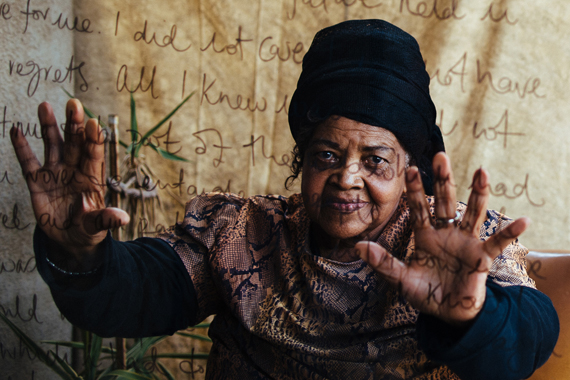Miriam Tlali (1933-2017): Novelist, short-story writer and the first Black woman in South Africa to publish a novel. She was one of the first people to write about Soweto, and her work was banned under the apartheid regime.

Miriam Tlali was one of the founding members of Staffrider magazine, a literary and arts magazine catered to the South African community, originating from Johannesburg. This magazine ran from March 1978 until 1993. Miriam was a terrific writer with a brave and outspoken voice to call out injustice and harassment due to apartheid. It becomes natural that such a ‘controversial’ and ‘sensitive’ voice will be tried to push down. Somewhere away from the mainstream, to protect national integrity, the legislation or whatever you would like to replace it with. But kindly replace it with an institution that is afraid to be slandered. Miriam and her language, her words, her novel were banned in her own country. Her novel, though without domestic support, was distributed in Japan, Holland, Germany and Poland. Her words did reach people. This writer wouldn’t be stopped. Once, she was banned minutes after a public reading in South Africa. The book was not yet published. But Miriam had no reasons to stop. She perspired towards getting a novel published later, translated as multilingual gems.
She continuously supported the work of other younger writers. In an environment where a ‘dangerous’ writer was either feared or detested. Miriam Tlali: Writing Freedom visualises and projects different, multiple appearances of freedom. How does freedom taste? What ingredients does freedom have? What colour is freedom? How much waiting does it warrant?
Muriel at Metropolitan (published in 1975 by Ravan Press) was her other novel for which she was recognised for. Miriam detested its title. It was renamed later in 2004, as Between Two Worlds, on her behest. The way she wanted. It captures the raw reality of daily life, due to racism and ill treatment owing to apartheid and general distaste for Black African people. These realities held Miriam’s will to bring them out there. Although this followed with a writer’s tragedy for her. Five chapters were removed.
But, she continued to write. Revealing more uprisings and more hardships. Coming from experiences where she was brutally hurt by legislation, physically, emotionally and mentally. She advocated women’s rights and actively volunteered as a member of the National Women’s Coalition emerging from South Africa. She was awarded the Presidential Award, the Order of Ikhamanga (Silver), and a lifetime achievement award from the South African Literary Awards.
Complied by Aishwarya Balasubramanian, December 2022
Bibliography
Footprints in the Quag, first published as Soweto Stories, Pandora, 1989
Mihloti, Skotaville Press, 1984
Amandla!, Ravan Press, 1980
Muriel at Metropolitan, changed to intended title, Between Two Worlds . Abridged publication, 1975. Full publication, Longman African Classics, 1979
Further Reading:
The critical legacy of activist writer Miriam Tlali
Miriam Tlali: 1933 to 2017 – Obituary
Rest in power, Miriam Tlali: author, enemy of apartheid and feminist
